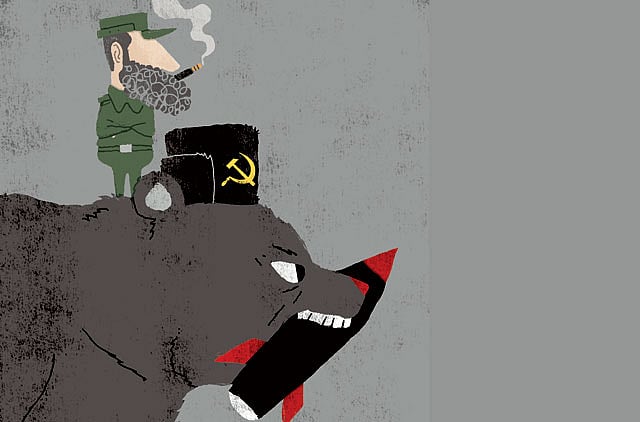If you are playing chess and your opponent moved one or two of his dangerous chess pieces in your yard, you will certainly concentrate on facing this challenge and getting rid of the imminent danger. Well, the Cuban missile crisis scenario was the same.
Fifty years ago, almost the entire world said America emerged victorious from the Cuban stand-off as it ended with the Soviets taking out their missiles from Cuba. That was the prevalent view, but the hidden facts and the content shows another victor.
The context of the whole crisis suggests it was more than a confrontation between the US and the former USSR, The missile crisis was only the peak of a long Cold War tale. The road to the crisis started earlier; the Bay of Pigs in August 1962 was not the beginning, but an acceleration towards it.
In 1958, the US deployed Thor nuclear missiles in Britain, and in 1961 they deployed Jupiter nuclear missiles in Italy and Turkey. With such steps, Americans would be able to strike Moscow with 100 nuclear missiles at least.
With the deployment of those missiles close to the Russian border, the Soviets felt threatened, the dangerous American chess pieces were in Russia’s backyard.
But in 1958, the Russians started their counterattack. According to the former British intelligent officer Peter Wright in his book Spy Catcher, in December of that year, the former Soviet leader Nikita Khrushchev asked the newly-appointed head of the intelligence agency, the KGB: how could the Soviet Union defeat the West without a war? Now we know the answer to that question might be the first step towards the missile crisis four years later. According to Wright, Russian intelligence at that time launched a strategic, deceptive plan. One of the main weapons in this plan were the defectors. As Wright explained, “the defectors start[ed] flowing from the heart of the Russian intelligence machine by the beginning of the 1960s”. Among many goals in this spying war, Wright points out, the main objective for the Russians was their Ballistic missile capability. They wanted the West to believe that the Soviet Union was way behind the West. That’s what the “fake defectors” conveyed to the American and British intelligence (CIA, MI5, MI6), according to Wright.
While the fake Russian defectors were doing their job, Americans didn’t give up their attempts to overthrow Fidel Castro in Cuba, the last attempt was the “Bay of Pigs” invasion which turned into a real catastrophe for John F. Kennedy and his administration in August 1962. Soon after, the Russians deployed their missiles — secretly — in Cuba. When Americans spotted the missiles on October 14, 1962, they actually swallowed the message conveyed by the defectors. The Russians deployed medium range missiles in Cuba not ballistic (long range) ones, a fact that would lead people only to believe what defectors had been saying for years before that.
So, Russia’s dangerous chess pieces reached America’s backyard, the same move the Americans had made four years earlier by deploying missiles in Britain in 1958 and in Italy and Turkey 1n 1961. What happened later is known. For two weeks, the world held its breath while Americans and Russians were deeply involved in a dance of death. The hardest negotiations ever in history were going on and the deal was: Russians should remove their missiles from Cuba, but the secret part of the deal was that the Americans on the other hand would remove their Jupiter and Thor missiles from Turkey and Italy. Furthermore Americans would undertake not to overthrow Castro.
So who was the winner? Fidel Castro and his regime is still in power, 50 years after the crisis, and that was one main goal for the Soviets at that time. The other goal was to convince the West that they were way behind the Americans and the West in missile technology, according to Wright, again. From his point of view, that was the beginning of a global atmosphere which led to the negotiations on arms control and resulted the “START” treaty.
Mohammad Fadhel is a Bahraini writer and media consultant based in Dubai.
Sign up for the Daily Briefing
Get the latest news and updates straight to your inbox
Network Links
GN StoreDownload our app
© Al Nisr Publishing LLC 2026. All rights reserved.
